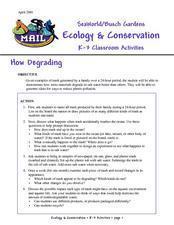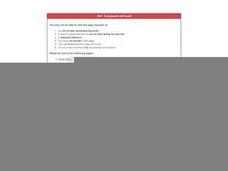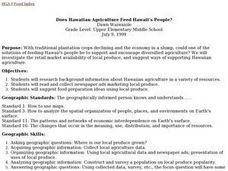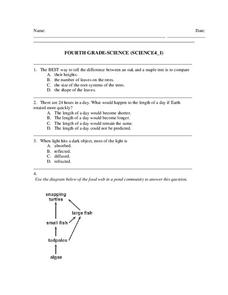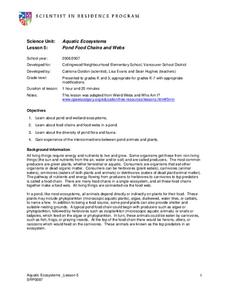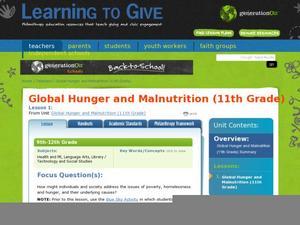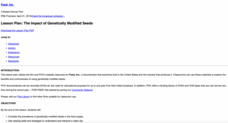Curated OER
Energy in Living Systems
High schoolers are asked: Is our life's purpose over when it's over? What happens to our bodies? They analyze the flow of energy through living systems. Students compare the metabolism of autotrophs with that of heterotrophs. They...
Curated OER
It's all Interconnected
Students participate in a number of activities to investigate the food web, species extinction, predators and prey, and biological diversity.
SeaWorld
Ecology & Conservation
How much trash does an average family produce in 24 hours? Where does that trash end up? Get your youngsters thinking about ecology and conservation as they discuss the impact pollution has on the marine environment. After a deep...
Royal BC Museum
Kids Page - Whales
Read about the physical features of whales and how they are grouped according to their method of eating food. A neat activity is described on the page; consider carrying this out in class. The resource makes a nice addition to a lesson...
LABScI
Atomic Structure and the Periodic Table of Elements: The Secret Agent Lab
Food always gets attention! Model atomic structure using fruit loops to represent the subatomic particles. After building models, scholars create ionic bonds using their models. Finally, they use these concepts to create a periodic table.
Curated OER
The Melting Pot: Diversity is the Spice of Life
Learners identify from which continents different foods come, sample foods from other cultures, identify spices used around the world, and respect culture of others through food.
Curated OER
Parts Per Million
Pupils perform serial dilution of food coloring experiment with partner, examine concentration levels, and differentiate parts per million (PPM) and parts per billion (PPB). Students complete pre-lab and post-lab questions and data table.
Curated OER
Nutrition
First graders identify the Five Food Groups and the proper servings of each. They study the physical features of different foods such as fruits, and vegetables.
Curated OER
Burn Baby Burn
Pupils use the Internet to research information on the food pyramid, recommended daily allowances of nutrients, caloric intake and expenditure, and value of foods. They analyze their own eating habits and exercise level.
Curated OER
Geography and our Family Favorites
Students talk with older family members about favorite family foods and where they have originated. They learn the process that went into the preparation and cooking of these foods and contrast how technology has affected food...
Curated OER
Does Hawaiian Agriculture Feed Hawaii's People?
Students research background information about Hawaiian agriculture in a variety of resources, then read and collect newspaper ads marketing local produce. They suggest food preparation ideas using local produce.
Curated OER
Design a Plankton
Students explore animal and plant adaptation. In this ecosystems science lesson, students view websites to gain information about plankton and its interdependence within ecosystems. Students identify ways in which plankton has adapted...
Curated OER
Sea Connections
Students, after locating different marine habitats on a globe, play a card game about ecosystems, food webs and organisms.
Curated OER
Fresh Greens In The Home
Young scholars engage in the study of nutritional food choices that include fresh greens. They investigate the benefits of using simple planting techniques. The lesson also includes recipes for students to try out the habit of eating...
Curated OER
Fourth Grade Science
In this science worksheet, 4th graders complete multiple choice questions about day lengths, light and dark, food, recycling, and more. Students complete 25 questions.
Curated OER
Heat 1
In this heat worksheet, students determine the heat gained or lost when matter changes phases. Students review the energy flow through ecosystems by comparing trophic levels and food webs. This worksheet has 10 fill in the blank, 5 short...
Curated OER
Aquatic Ecosystems
Students study ponds and wetland ecosystems and examine the food chains and webs in them. In this aquatic ecosystems lesson plan students answer questions about the diversity of the flora and fauna in a pond.
Curated OER
The Macaroni Lab
Pupils are given an introduction to the "ecosystem", what factors make up an ecosystem (biotic factors, abiotic factors, food chain, producers, consumers and decomposers) and how those factors interact.
Captain Planet Foundation
P is for Poppies
Explore the way local farming and rationing helped the war effort in World War I with a lesson plan on gardening. After learning about trench warfare, reading "In Flanders' Field" by John McCrae, and studying poppies, kids discuss the...
Curated OER
Global Hunger and Malnutrition
Is there a difference between hunger and malnutrtion? Is this a problem only in third world countries? How does hunger and malnutrition affect the community? Why do these problems exist when the world produces enough food to feed...
Polar Trec
Why Can’t I Eat This Fish?
Can turning on the television lead to toxins in the food supply? The instructional activity offers an opportunity for young scientists to complete guided research. A worksheet lists each question as well as the web page necessary to...
Desert Museum
Daisy Ecology
Here's a fine lesson that combines poetry with life sciences. Learners carefully listen to a poem that's all about a food chain. As the poem is read, learners name the producer, the herbivore, the carnivore, and the omnivore. Lots of...
PBS
The Impact of Genetically Modified Seeds
What is all the fuss about genetically modified foods? PBS provides this resource designed to supplement the documentary Food, Inc. to help learners investigate the benefits and controversies of genetically modified foods for individuals...
Curated OER
Pizza Farm Activities
Students identify the food groups and agricultural sources of pizza ingredients. They construct a construction paper pizza, identify the crops grown for pizza ingredients, and make and eat English muffin pizzas.




